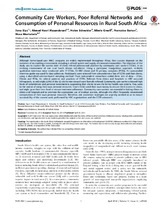Community care workers, poor referral networks and consumption of personal resources in rural South Africa
Date
2014Author
Sips, Ilona
Mazanderani, Ahmad Haeri
Schneider, Helen
Greef, Minrie
Barten, Francoise
Moshabela, Mosa
Metadata
Show full item recordAbstract
Although home-based care (HBC) programs are widely implemented throughout Africa, their success depends on the existence of an enabling environment, including a referral system and supply of essential commodities. The objective of this study was to explore the current state of client referral patterns and practices by community care workers (CCWs), in an evolving environment of one rural South African sub-district. Using a participant triangulation approach, in-depth
qualitative interviews were conducted with 17 CCWs, 32 HBC clients and 32 primary caregivers (PCGs). An open-ended interview guide was used for data collection. Participants were selected from comprehensive lists of CCWs and their clients, using a diversified criterion-based sampling method. Three independent researchers coded three sets of data – CCWs, Clients and PCGs, for referral patterns and practices of CCWs. Referrals from clinics and hospitals to HBC occurred infrequently, as only eight (25%) of the 32 clients interviewed were formally referred. Community care workers showed high levels of commitment and personal investment in supporting their clients to use the formal health care system. They went to the extent of using their own personal resources. Seven CCWs used their own money to ensure client access to clinics,
and eight gave their own food to ensure treatment adherence. Community care workers are essential in linking clients to clinics and hospitals and to promote the appropriate use of medical services, although this effort frequently necessitated
consumption of their own personal resources. Therefore, risk protection strategies are urgently needed so as to ensure sustainability of the current work performed by HBC organizations and the CCW volunteers.

